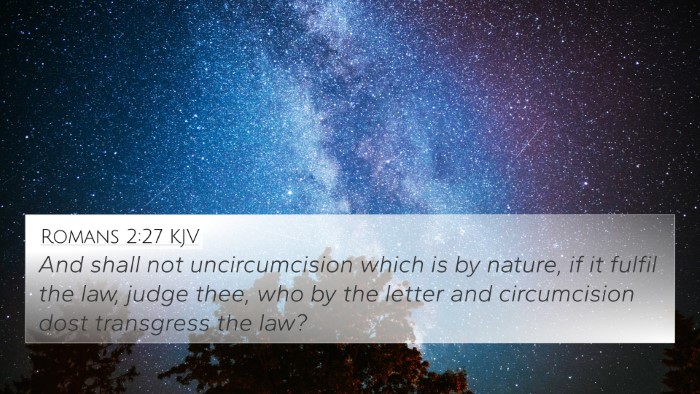Understanding Romans 2:14
Bible Verse: Romans 2:14 (KJV) - "For when the Gentiles, which have not the law, do by nature the things contained in the law, these, having not the law, are a law unto themselves."
Overview of the Verse
This verse is part of the Apostle Paul's discourse addressing the moral condition of the Gentiles, illustrating how they are capable of adhering to God’s moral law even without the written laws given to Israel. Paul emphasizes that innate moral understanding exists universally among humanity, suggesting that all people, regardless of their access to Scripture, are accountable to God's standards.
Commentaries Insights
-
Matthew Henry's Commentary
Henry posits that the Gentiles, despite lacking the Mosaic law, demonstrate an inherent sense of right and wrong. Their natural inclination to uphold moral standards acts as an internal compass, validating the moral law's existence and their accountability before God. Henry insists that this reflects God's universal justice and moral order.
-
Albert Barnes' Notes
Barnes notes that the idea of Gentiles adhering to the law "by nature" suggests that humanity possesses an innate moral sense, often termed the conscience. He asserts that this inherent understanding indicates the law's universal applicability, meaning salvation is not exclusive to the Jews, affirming God’s righteousness in judging all people.
-
Adam Clarke's Commentary
Clarke elaborates on the notion that the Gentiles manifest God's laws through their actions, which indicates a level of divine grace operating within them. He interprets this behavior as an acknowledgment of the divine order and a testimony to the possibility of righteousness outside the written law.
Thematic Connections
Romans 2:14 connects broadly with themes of moral law, conscience, and the universality of God's justice:
- Accountability before God (2 Corinthians 5:10)
- Innate righteousness (Romans 1:19-20)
- The role of conscience (Romans 2:15)
- God’s impartiality (Acts 10:34-35)
- Universal revelation of God's nature (Psalms 19:1-4)
- The significance of the law (Galatians 3:24)
- Righteousness through faith (Philippians 3:9)
- Judgment according to deeds (Revelation 20:12)
- Grace for the nations (Isaiah 56:6)
- Living according to truth (John 3:21)
Cross-Referencing Biblical Texts
To navigate deeper into the meaning of Romans 2:14, we can leverage various cross-references that illustrate its themes:
- Romans 1:19-20: Insights about God's invisible attributes being evident to all creation.
- Acts 10:34-35: God's impartiality and acceptance of those who seek Him.
- James 1:22: The necessity of being doers of the word, not merely hearers.
- Galatians 5:14: The command to love one another fulfills the law.
- 1 Timothy 1:8: The legitimate use of the law is grounded in love and faith.
- Titus 2:14: The call for believers to be zealous for good works.
- Matthew 5:17: Jesus’ affirmation that He came to fulfill the law, not abolish it.
- Romans 3:20: The law's role in revealing sin.
- Isaiah 51:4: A call to nations to listen to God's law.
- 2 Peter 1:20-21: The inspiration of Scripture by the Holy Spirit.
Conclusion
The implications of Romans 2:14 highlight the broadness of God’s justice and mercy, illustrating that while the written law was given to Israel, God’s moral order transcends cultural and geographical boundaries. The innate moral compass within humanity serves as a testament to God's image in us all, calling every individual to the standards of righteousness inherent in creation. As believers seek to deepen their understanding through tools for cross-referencing and biblical studies, this verse serves as a vital connection point within the broader narrative of Scripture.















